It started with a tweet. Two years ago, journalist and author Tracey Spicer became the face of Australia’s #MeToo movement in less than 140 characters.
“Currently, I am investigating two long-term offenders in our media industry. Please, contact me privately to tell your stories,” she wrote on Oct. 18, 2017, 13 days after the Harvey Weinstein story broke in the New York Times.
It blew up. By the following March, Spicer had founded the organisation NOW Australia, intended as a “one-stop shop” where people who had been sexually harassed or assaulted could access legal and counselling services. Next month, Spicer will accept the Sydney Peace Prize alongside Tarana Burke, the grassroots founder of #MeToo, for her work.
NOW was the Australian version of Time’s Up, the organisation started by Hollywood celebrities in January 2018 that has raised more than $22 million for its legal defence fund, and connected thousands of men and women to lawyers.
But in its first 18 months, NOW Australia has built up no such momentum. Launched hastily and with much fanfare, the organisation has failed to live up to any of its lofty promises.
In an era where tweets have launched social movements, NOW offers a cautionary tale: how a well-intentioned group lacking infrastructure and experience can collapse under the weight of its own expectations. Elsewhere, #MeToo movements have turned momentum into action and legislation – but the Australian iteration has struggled to lock in its cultural gains.
Glowing media coverage of NOW promised a triage service that would direct survivors to legal support, counselling and journalists. But behind the scenes tensions were running high between Spicer and board members over what they could realistically achieve.
Spicer stepped away from the group, later saying she had experienced vicarious trauma. The triage plan was abandoned after a strong backlash from existing services and advocacy groups. And people already working in the trenches of the sexual violence sector are furious, accusing NOW of squandering a moment they will never get back.
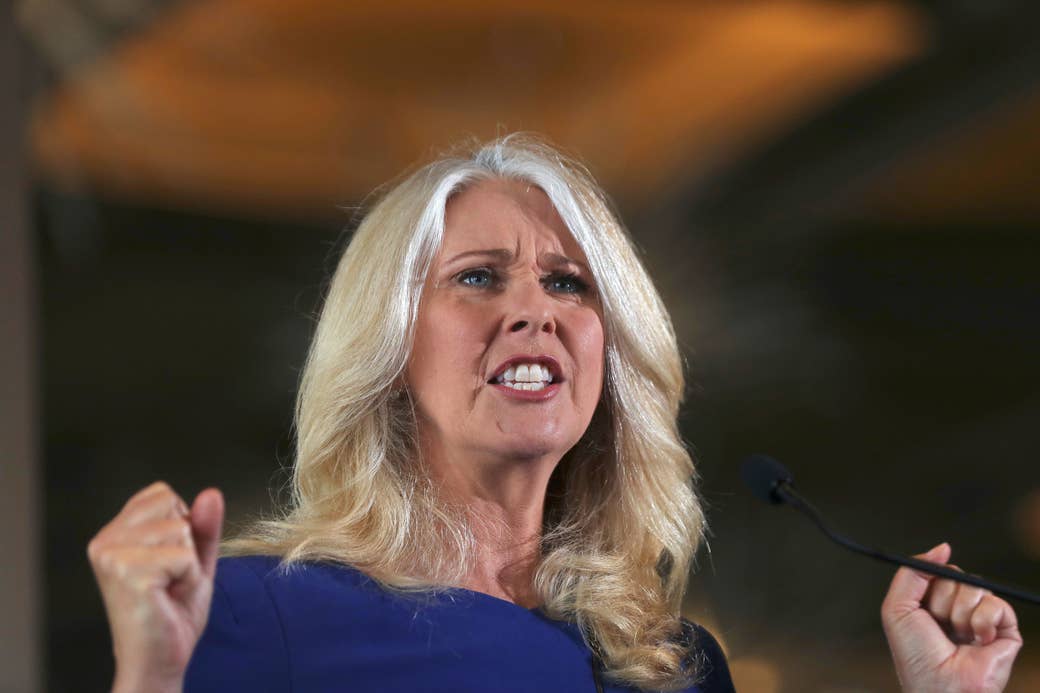
One of the names “mentioned more than any other” in Spicer’s inbox was Don Burke, a beloved Australian television presenter who hosted gardening program Burke’s Backyard. And, it turned out, a relentless sexual harasser with an anger management problem, according to a blockbuster joint investigation from the Sydney Morning Herald and the ABC, working closely with Spicer, in November 2017.
It was Australia’s first major #MeToo story. And more seemed just around the corner.
Spicer was a household name herself, a veteran newsreader who publicly took on the commercial TV network that dismissed her shortly after she returned from maternity leave. She later called out the sexism of the media industry in her “femoir”, The Good Girl Stripped Bare.
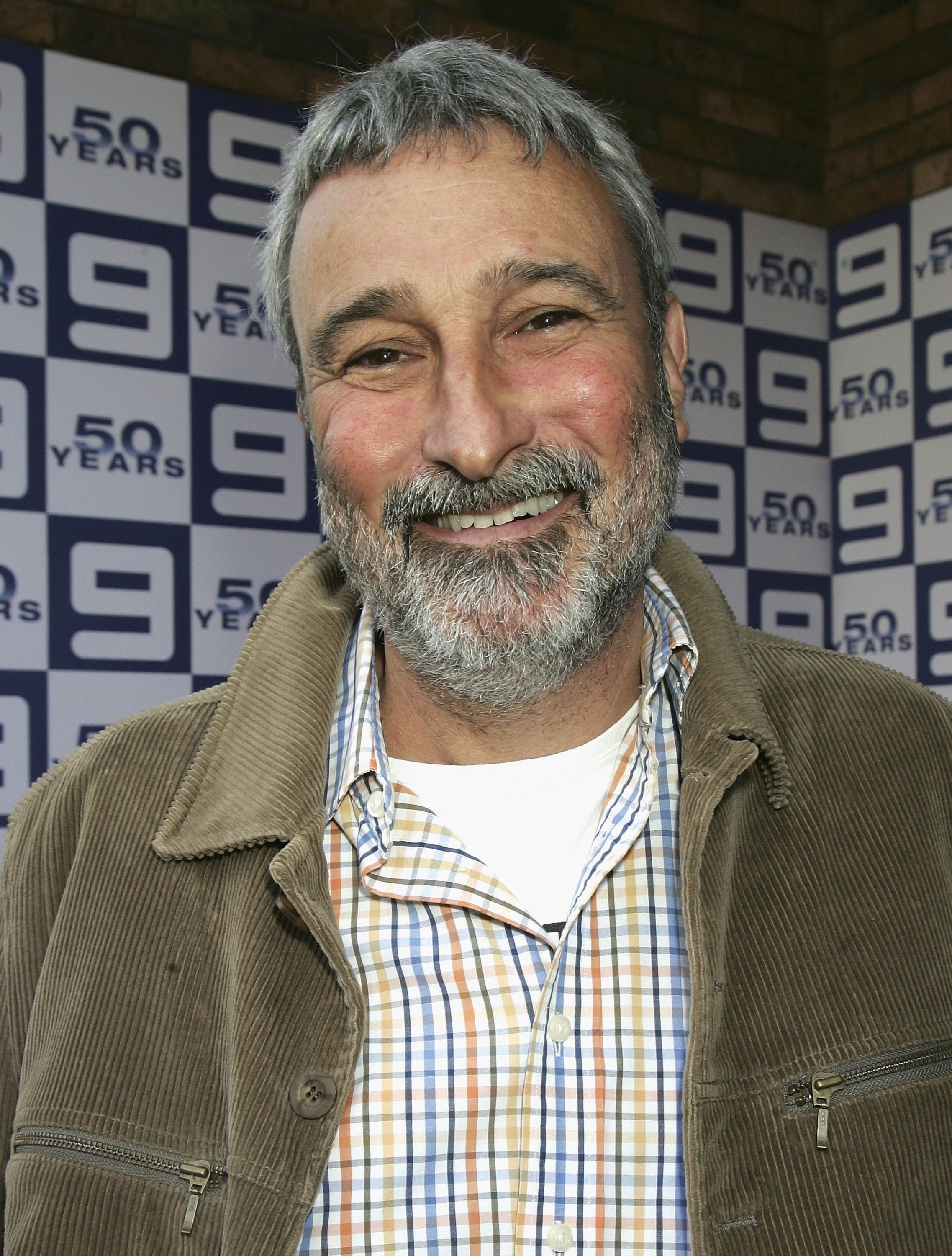
She regularly trumpeted the fact that her inboxes were bulging with messages from survivors. Hundreds of women came forward within a day of her tweet, she said. On the day the Burke story dropped, another 100 rolled in, taking her count to 670. Initially Spicer pledged to reply within 24 hours, then 48. She repeatedly said that women who disclosed their story to her would get the support of professionals.
The tweet was short and non-specific, but Spicer was a journalist and the context of the Weinstein story suggested she intended to expose serial high-profile predators. In its wake, she claimed to have learnt about dozens of household name offenders, most with multiple accusers.
Some stories did come. Shortly before the Burke story was published, Wolf Creek actor John Jarratt was accused of rape in News Corp tabloid the Daily Telegraph. (He was found not guilty this year.) The same newspaper published a story on film star Geoffrey Rush at the end of 2017, then the Herald and the ABC published accusations against actor Craig McLachlan in early 2018. Rush and McLachlan sued for defamation, and things slowed down.
There were early signs Spicer wasn’t coping with the influx of disclosures. In February 2018 Spicer posted that she had discovered hundreds of messages from mid-December 2017 that she hadn’t yet answered.
“Eek!” she wrote on Facebook. “So sorry. Will get on to these in the coming weeks…”
A week later, she wrote that she had realised investigating the stories was “too big” a task for her and the “swamped” team she was working with. Spicer announced she would be working with a wider pool of media outlets.
In the same post — a month out from NOW’s launch — Spicer revealed she was starting an organisation to help people who had experienced sexual harassment or assault. In effect, NOW would be taking the triage work off her hands.
Sydney woman Amelia — a pseudonym to protect her privacy — had only ever disclosed to a handful of people the sexual harassment and assault she experienced at the hands of a TV personality she worked for.
But in November 2017 she read that Spicer was soliciting disclosures to an email address set up by the journalism and entertainment union, the Media, Entertainment and Arts Alliance (MEAA).
“Women sending information will be offered counselling and any support they need,” Spicer told the Daily Telegraph at the time. She would later say publicly that she had connected “every person who has disclosed to me” to lawyers or counselling services.
A large number of disclosures flowed into the inbox at the end of 2017. An MEAA spokesperson said it was monitored daily by a union staff member and Spicer was also able to access it.
Amelia was one of the women who sent an email. It had the perpetrator’s name in the subject line and included a detailed description of what she and her colleagues had endured.
“After a couple of months I gave up expecting a reply.”
“It makes me incredibly frustrated and scared that he can keep bullying and harassing women while still being idolised by many,” she wrote in the email, seen by BuzzFeed News. She asked that if her story wasn’t relevant, could she be redirected to someone who “might find it useful”.
Amelia said she thought the email would be read by Spicer, who she assumed had a team. She also thought she might receive a generic response about high volume. She wasn’t sure if the man she was accusing was “high-profile enough” — but she didn’t expect “radio silence”.
“After a couple of months I gave up expecting a reply,” Amelia said. “Yeah, I guess I just thought they had bigger fish to fry and the behaviour I had experienced wasn't violent or criminal enough to warrant using their resources.”
Spicer told BuzzFeed News the response to her tweet had been “overwhelming”.
“I tried my very best over a period of eight months, as an individual working pro bono from a home computer, to ensure that all of those brave souls received a response,” she said. “I am deeply sorry if any were missed.”
The MEAA spokesperson said the union had received no complaints from anyone who sent an email: “If we have failed to respond to someone who sought our assistance that is deeply regretful and we apologise.”
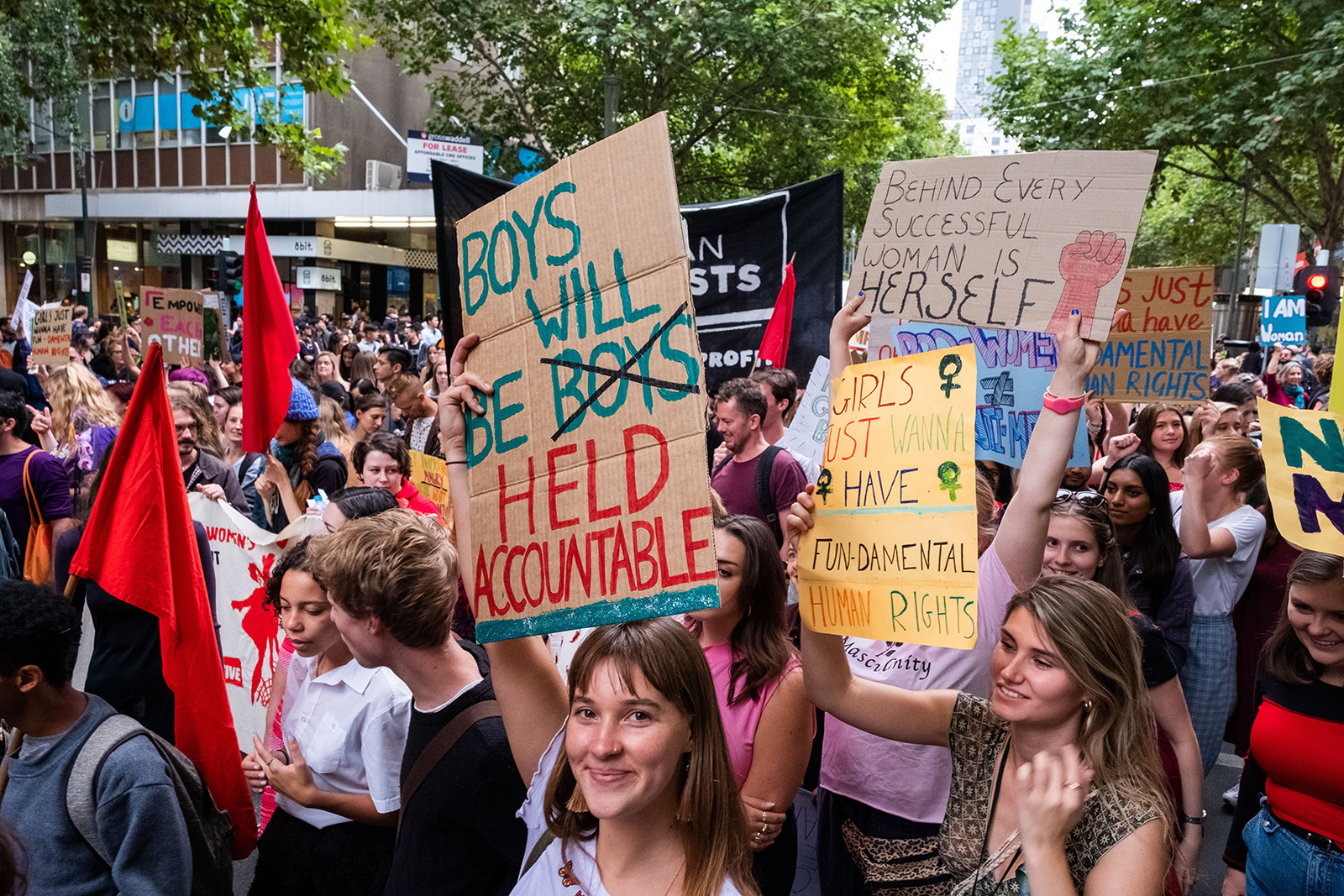
While Amelia was waiting to hear back about her traumatic experience, Spicer was racing to the finish line to launch NOW — working title Time’s Up Australia — ahead of International Women’s Day in 2018.
What had started as a few emails between women had rapidly bloomed into an organisation with celebrity ambassadors like singers Tina Arena and Isabella Manfredi and actor Deborah Mailman, and a 35-person steering committee. From the beginning, Spicer said she intended to set it up and bow out, not remaining on the board or employed by NOW.
She pulled together women from a mish-mash of professional backgrounds: corporate, academia, entertainment and media. Few had operated in the non-profit sector. They had just one face-to-face meeting, in Sydney in early 2018, chaired by Spicer. Tina Arena dialled in. Though everyone was enthusiastic, only a handful were actually doing the work to get to launch. But the mood was excited, frenetic. The women felt like this was the moment and they had to seize it.
“We've been getting some questions about where the money will go, so we need to lock that down in the next few days,” Spicer wrote in an email to the group in mid-February, the month before launch.
She outlined what NOW would offer: legal assistance, connecting women to trusted female journalists, research, education, lobbying and counselling. Next to the latter, Spicer wrote: “This is where we need to be specific. Which counselling service/group of psychologists should we be connecting with? ... Or do we hire a full-time staff member who is trained in sexual assault counselling and — if she's overwhelmed — triage these calls to the already-existing (albeit stretched) free services, at hospitals etc...?”
Even during the pre-launch stage, there was unease over whether they could pull it all off.
“There were definitely conversations at an early stage that this was too ambitious,” a person with direct knowledge of the launch preparation, and who requested anonymity in order to speak candidly, told BuzzFeed News. The source recalled a conversation specifically about the triage service: “This will be tonnes of calls, you’ll need tonnes of staff, this won’t be easy, it might be impossible.”
Discussions with groups already offering similar services were limited. The Australian Human Rights Commission, where individuals can lodge complaints of sexual harassment, and 1800RESPECT, the national sexual assault and family violence counselling service, confirmed to BuzzFeed News no-one from NOW consulted them prior to the launch.
Helen Campbell, chief executive of the Women’s Legal Service, said she received a phone call from Spicer: “She just told me that [NOW was launching] and I talked about our legal service and she said she would get back to me to talk about it some more but she never did.”
Rape and Domestic Violence Services Australia executive officer Karen Willis said she was aware NOW Australia was about to launch, but had few details: “It wasn’t a formal consultation but Tracey and I had conversations about it.”
Weeks out from launch, there was no clear plan for staffing or funding, according to emails seen by BuzzFeed News. “It was coming from a good place. It was just really fucking rushed,” the source said.
One of the things NOW did nail was the press. “Tracey was very aware of the media angle,” the source said. And so, on March 25, 2018 (having missed the International Women’s Day deadline), Spicer, her team and an impressive line-up of Australian celebrities lifted the veil on the new organisation.
Launch articles promised a triage service — a one-stop shop survivors could call to be connected with legal and counselling support, that would also deliver research and education programs and develop policy solutions.
Although it had only been registered as a company three days earlier and didn’t have a board, NOW’s website asked for donations to a $250,000 fund. And a short black-and-white video, featuring Australian household names including Missy Higgins alongside Spicer, was published online.
“It’s time for action, it’s time for change,” the women in the video said. “Not tomorrow. Not the next day. Not in the future — but now.”
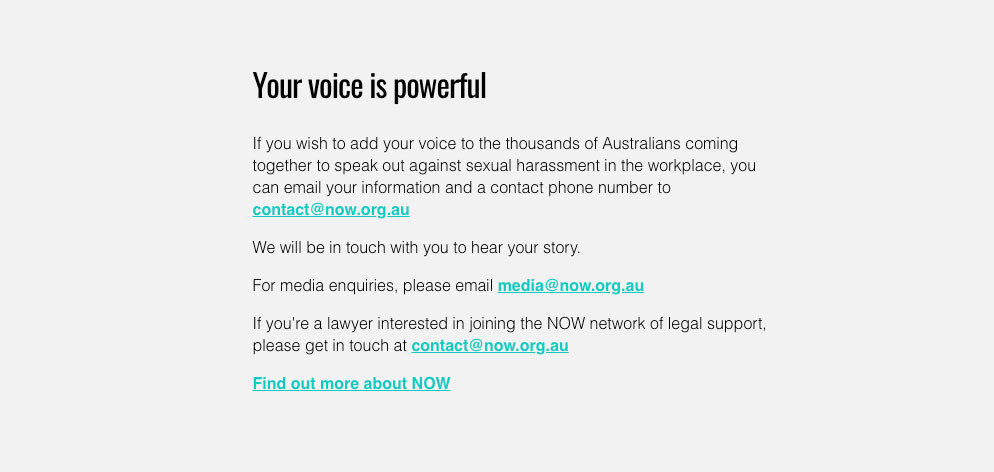
It only took Nina Funnell a few hours to sound the alarm.
On the morning NOW launched, the award-winning investigative journalist and survivor advocate fired off a quick, firm email to Spicer.
NOW was “wildly problematic”, Funnell wrote, and Spicer had “left [herself] wide open for an absolute take down”.
The NOW website was in need of a proof read, and while it prominently featured a call for donations, it didn’t have any hotline numbers or link to any resources for complainants.
“It reads as peak-white-feminism,” Funnell wrote to Spicer. “There's absolutely no support for survivors.”
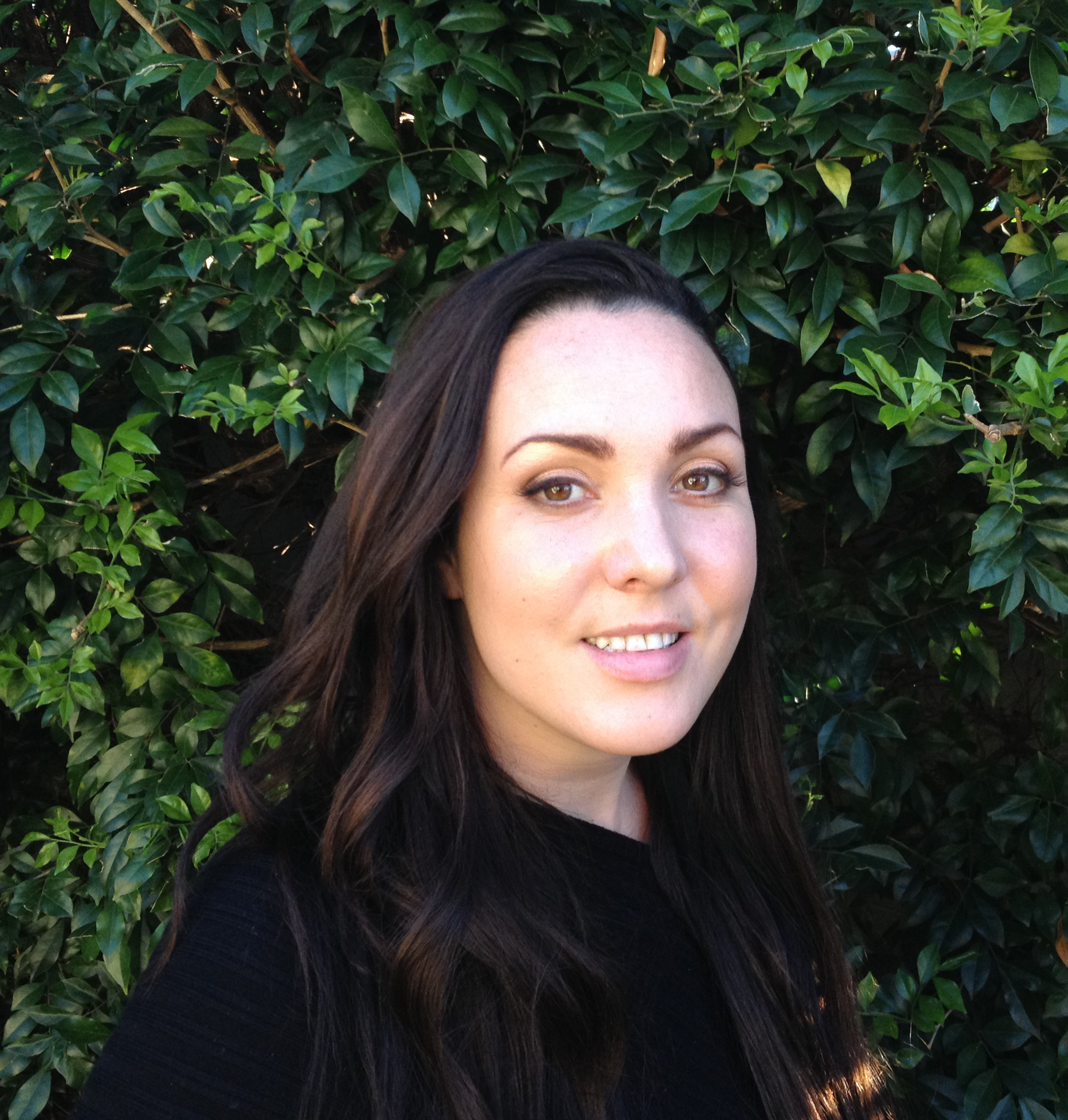
Funnell, who has served on the boards of organisations fighting violence against women, was dubious about the idea of a triage service. She believed frontline services in the sector would be against the idea, telling BuzzFeed News “you can’t refer people to services that don’t exist” or that are already stretched beyond capacity.
“It’s not clear what the quarter of a million will be used for except to connect survivors with legal and counselling support. (There are already expert services that do that... are you directing the funds to them or proposing to invent a new service? [It's] not clear...),” Funnell wrote to Spicer.
Funnell told BuzzFeed News she intended the email constructively, wanting to avoid a public calling out.
Spicer’s reply came 20 minutes later, 12 NOW organisers newly copied in. She insisted that the organisation was diverse and had consulted with women’s and legal sectors, mentioning the Women's Electoral Lobby and Our Watch, among others.
“As I have said in every interview...we will be acting as a portal or triage service, in the same way I have been personally (albeit completely unqualified),” she wrote, adding that service would launch in a month.
Spicer finished her email with this: “I always find it incredibly disappointing when feminists criticise other women working voluntarily to try to make the world a better place.”
Within a few hours, Funnell had backed down and apologised in a return email. Later, she would come to believe her initial reaction was the right one.
Funnell told BuzzFeed News NOW was the “great feminist Fyre Festival” in the sense that promotional material had been prioritised over logistics.
“When they launched they had Instagram influencers, social media tiles, NOW branded merchandise, and even a specially recorded soundtrack,” Funnell said. “But there was one major problem: no-one had bothered to properly consult the sector so there was no real substance.”
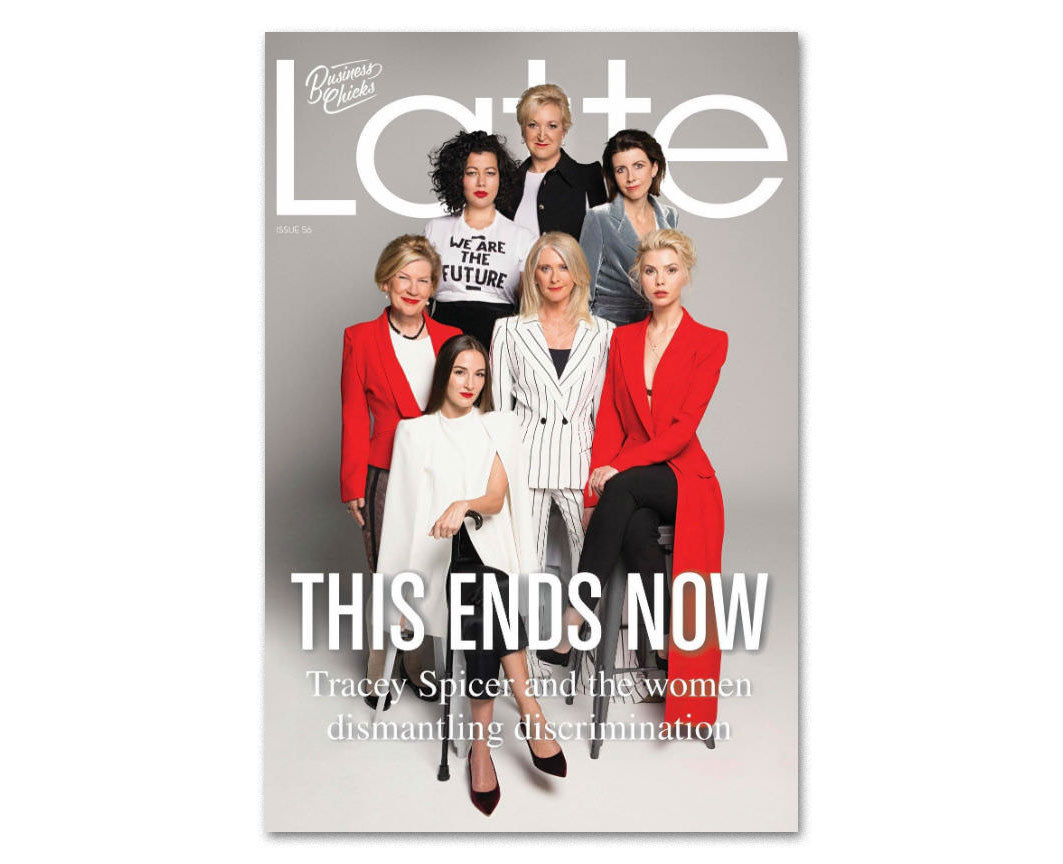
“THIS ENDS NOW” announced the cover of the June edition of Latte magazine, a bi-monthly glossy produced by networking organisation Business Chicks.
The cover, showing Spicer surrounded by six other women involved with NOW, heralded Spicer’s nationwide “What Now?” workshop tour with Business Chicks. For $139 attendees could be transformed into “outspoken women” with Spicer’s advice on body language and social media, as well as tips for those who’d been silenced or sacked due to harassment and discrimination.
The tour had bothered Laura La Rosa, a Darug woman, feminist writer and critic. She knew that #MeToo had been founded by black civil rights activist Tarana Burke, but was concerned that NOW was “glaringly white and middle-class in its representation”.
After she asked Business Chicks how, exactly, the tour would be supporting NOW — how much money would they donate? – and got no reply, La Rosa called it out on Facebook, writing that the tour would be inaccessible to poor women.
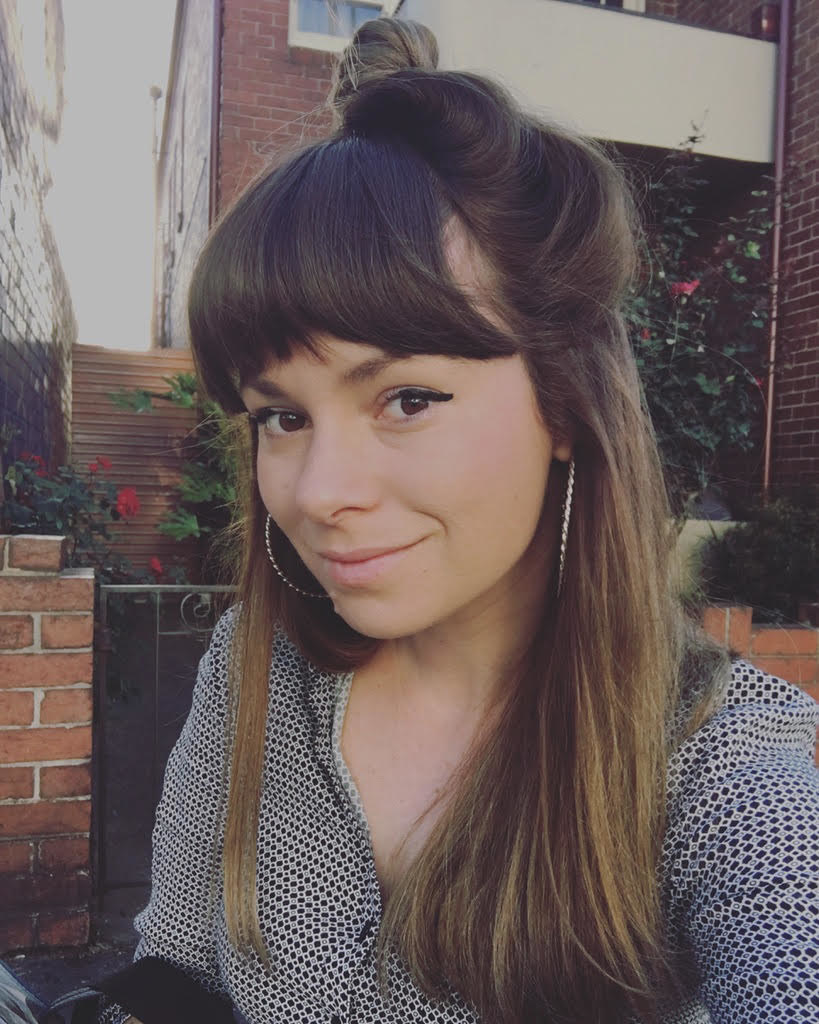
Spicer responded in the comments, saying Business Chicks would make a “substantial donation” to NOW’s triage service, which would in turn provide low-paid workers with free support. “Please don't attack a bunch of women working in a volunteer capacity,” she wrote. “I speak, for free, at about 100 events a year about how to deconstruct the system. Frankly, it would be easier to achieve this if people weren't so busy trying to tear each other down.”
La Rosa told BuzzFeed News the cover — on which six out of seven women were white — spoke volumes about “a glaring disconnect from real issues impacting those on the margins”. She wrote a critique of the cover and “trickle-down white feminism” for Eureka Street. It was NOW’s first piece of negative press.
It also cost the organisation a board director: Nareen Young, a university professor with years of not-for-profit sector experience, including as CEO of Diversity Council Australia. When the cover went live, Young tweeted: “I didn't know about it and I am beyond furious. And I've just seen Instagram and some of what has been offered up. Shameful and embarrassing. Considering position.”
Young resigned before the first Annual General Meeting in November 2018. She told BuzzFeed News she didn’t believe the cover was “deliberately exclusionary”, but that Spicer had not consulted with the board on who should be involved.
“It sent a message that NOW was about white, thin, blonde corporate women.”
The Latte debacle was just the tip of the iceberg.
Publicly, NOW had enjoyed a positive reception on launch, though it had raised only half of its quarter of a million dollar fundraising target. Privately, the blowback had been swift.
The feedback from people and organisations in the women’s and legal sectors was unanimous: there was “no way in the world” NOW should offer a triage service.
“We weren’t a trauma-informed organisation, we weren’t legally qualified, we weren’t counselling qualified, and we didn’t have enough money,” said LJ Loch, NOW chairperson and a communications expert.
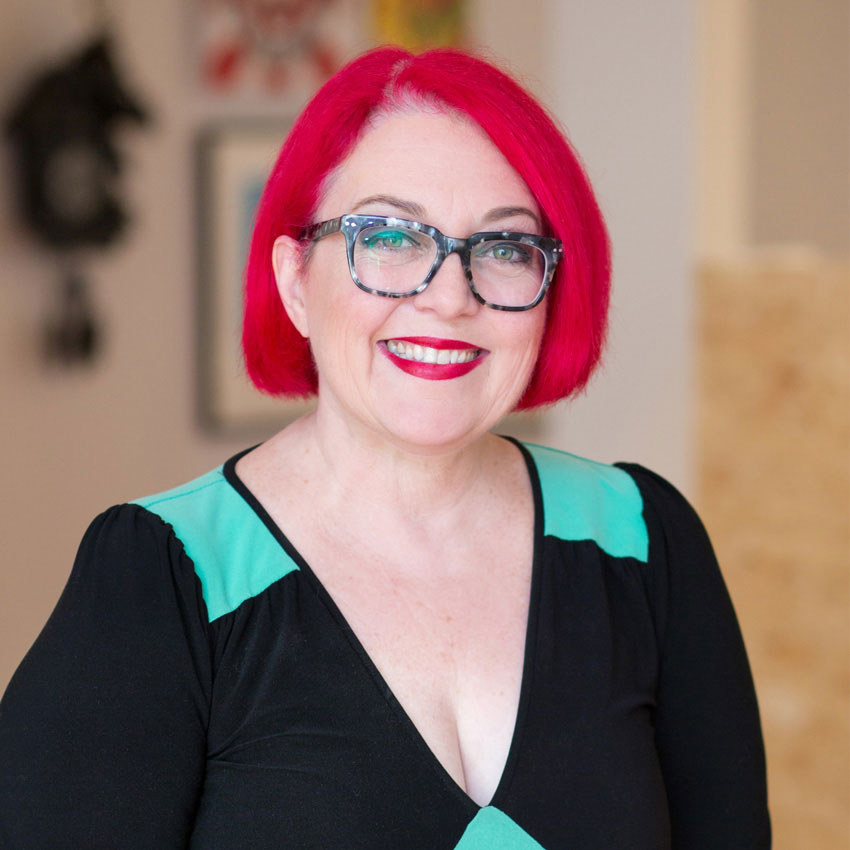
“It became very clear, very quickly that what we were proposing was problematic, and that we couldn't and shouldn't do it from an ethical perspective unless we were going to do it properly — because that would only compound the problems for the people who were wanting to disclose their stories.”
In the rush to launch, NOW had promised something that was both impossible to deliver with the resources it had, and that duplicated existing services like 1800RESPECT.
“We just got it wrong basically,” conceded NOW cofounder Katrina Irawati Graham, the chair of Women & Film In Television Australia. “It was a new kid on the block mistake … we came in and trod on people’s feet, which was the opposite of what we wanted to do.”
Founding director Avril Henry, an author and consultancy firm founder, said she learnt about the sector blowback at her first board meeting.
“I was like ‘shit’ and I was actually astounded that something like NOW would have been launched without talking to the Human Rights Commission, to the advocacy groups, to people like 1800RESPECT,” she said.
The board lacked some “fundamental skills”, Henry said, and along with the 35-person steering committee, there were way too many cooks.
“We weren’t a trauma-informed organisation, we weren’t legally qualified, we weren’t counselling qualified, and we didn’t have enough money.”
“I would be tearing my hair out and saying ‘this is why everything is so fucked, there are too many people involved on a superficial level without any detailed planning’,” she said.
Founding director Katherine Teh, a consultant and longtime campaigner against sexual harassment, took a while to come around. “It took a lot of convincing for me to believe that the triage service was something we shouldn’t be trying to do,” she said.
Eventually, the board unanimously reached the view the triage service could not happen. But Spicer remained convinced it was what NOW had to deliver.
Teh described the situation as “a difficult space”. The directors were “loyal to Tracey” and wanted to “honour all her work and effort”, but had to make decisions stepping away from her vision.
A complicating factor was that Spicer had no formal say. She held no role on NOW’s board, steering committee or executive.
“She was merely a cofounder who … took it upon herself to be the voice and the face of NOW,” said Henry.
In June 2018, a week after the Latte cover was published, Spicer announced she was stepping back from her work with NOW. The organisation would soon announce a new executive director who would work to set up the triage service, she said.
“Now is the time for me to get back to dealing with the many disclosures flooding my inboxes. There have been some shocking stories in the past few weeks, and I must focus on these people who need help,” she wrote.
Enter Kristine Ziwica, a journalist and consultant who has worked for more than 20 years on human rights and gender equality campaigns in Australia and abroad. She was hired as NOW’s interim executive director in June 2018 on a six-month contract.

Those who worked with Ziwica describe her as capable and collaborative. Loch said without Ziwica’s “no bullshit direction” NOW wouldn’t have made it through.
At the first board meeting Ziwica attended, NOW Australia scrapped a 30-page business plan outlining the proposed triage model: a 1800 phone line and an email that would be staffed 9am-5pm on weekdays.
The service, which the plan outlined, would cost an extra $285,000 and could expect 10 inquiries a day “based on Tracey Spicer’s experience in the past five months”. Ziwica told BuzzFeed News the plan was “not suitable”.
At the time Spicer sent a tweet saying she was looking forward to “working closely” with Ziwica to set up the triage service, Ziwica said she had already explained to Spicer both her own concerns and the feedback from others, saying to her: “We need to consult, and take those concerns seriously and really think about this.”
I met Kristine Ziwica today. She’s the new Executive Director for NOW Australia. We are looking forward to working closely with her to set up our triage service. Welcome, Kristine! @KZiwica @NOW_aust @WomensAgenda
The board formally walked away from the triage service after Ziwica further consulted the sector. Out of more than 80 stakeholders, not a single one supported the idea.
But even those who were originally critical of NOW were open to it changing direction to play a long-term role to raise awareness and hold government to account.
A frank board report presented by Loch at the November 2018 AGM made it clear NOW recognised it had made significant mistakes. “Setting up an organisation like ours would normally see scoping and cementing of relationships prior to the public announcement that we exist. We didn’t do that,” she said.
Loch’s report also said NOW simply didn’t have enough money to launch a triage service, “even if that were appropriate which we now know from our consultations it is not”.
“We didn’t know what we didn’t know,” Loch told BuzzFeed News. “We went out with the best of intentions as an organisation.”
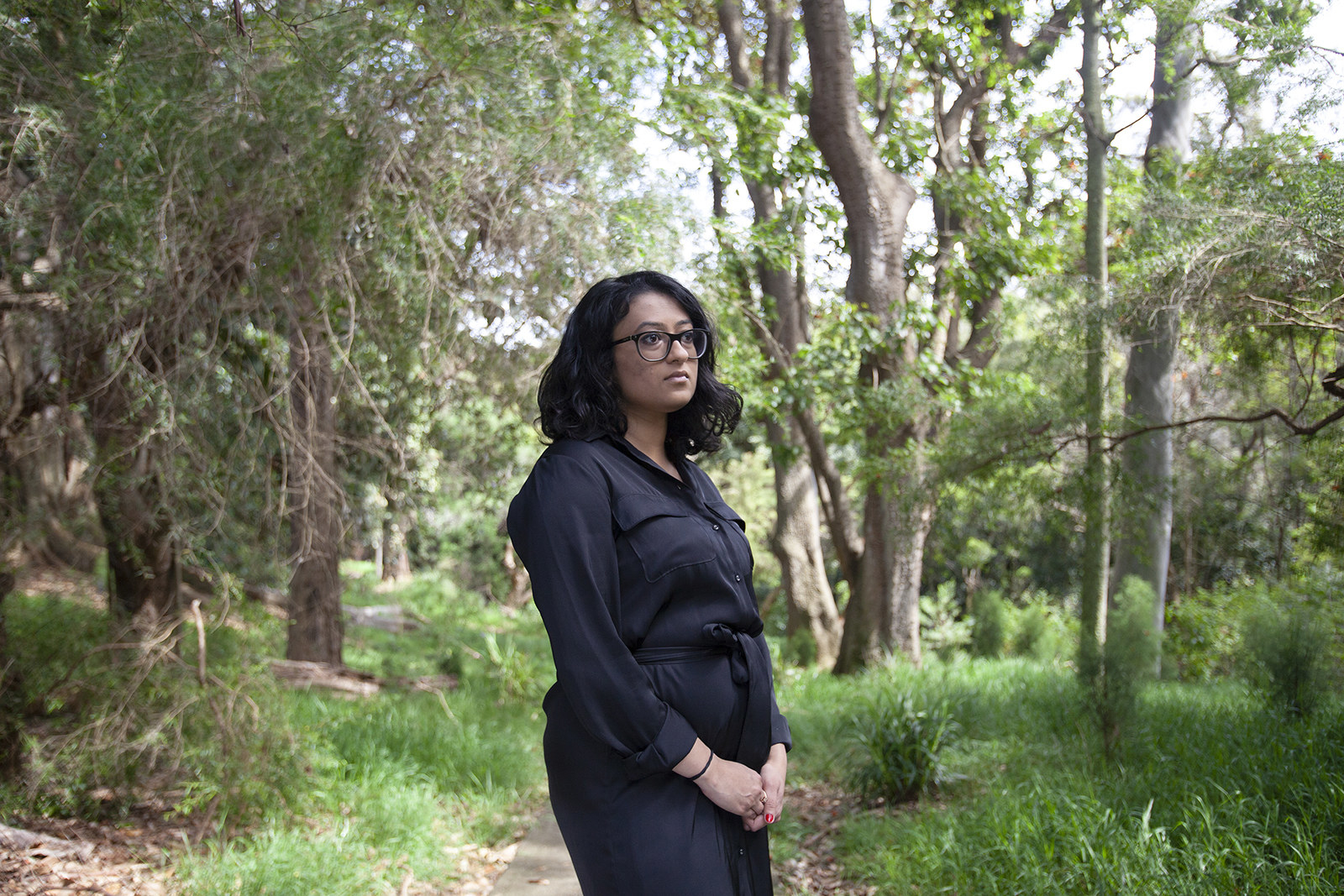
Watching NOW’s launch video, Dhanya Mani had no idea of the turbulence behind the scenes. The 25-year-old former parliamentary staffer only saw the promises of “legal support, media representation, education, counselling and confidential advice to end the intimidation and abuse”.
She was struck by two things: one, the racial diversity, and two, the fact Spicer said NOW was “non-partisan”. For Mani, a woman of colour and Liberal party member, these things were deeply important. She was particularly drawn by the promise of counselling and legal protection.
So more than a year before she eventually told the Sydney Morning Herald about her alleged sexual assault at the hands of a Liberal parliamentary staffer, Mani made the decision to approach Spicer with her allegations.
The #MeToo momentum gave Mani confidence that now was the time to speak out.
“I decided that I wanted to reach out to one of the most prominent titular figures of NOW … who had been making clear [in the media] that they wanted to hold incredibly powerful individuals in the media and other institutions to account, and that was Tracey Spicer.”
Mani emailed Spicer on May 25, 2018, asking if she could discuss the details of her disclosure in a conversation “rather than by email”, saying she would like to “seek some confidential advice”.
“The whole point of their advertising was not a year from now, not six months from now, but now.”
“She was the first disclosure I made with the intention of wanting to have a voice and speak out about my experiences, which was obviously incredibly emotionally important to me because I had all of those feelings where I hadn’t been confident that anybody would care or want to tell my story,” Mani said.
Mani expected a reasonably prompt reply. “The whole point of their advertising was not a year from now, not six months from now, but now,” she said. However, weeks passed and, like Amelia, she didn’t get a reply.
What Mani didn’t know was that a month earlier Spicer had posted a Facebook status in which she said her Fairfax email had been “shut down”. Mani didn’t see the status, or get a bounce back email, so assumed her email had been read and not replied to.
Mani said she interpreted the silence as an indication that her own experience had simply been categorised as unimportant.
There is no suggestion Mani’s email was deliberately ignored.
“I had thought maybe they are just prioritising those stories but they’ll get around to me and I just kept waiting and waiting for someone to reach out to me hoping it was just that,” Mani said.
It took her months to feel confident enough to try disclosing again.
“Through therapy and sheer force of will I tried to push myself into believing that I was worthy of recognition and that my story did matter … I pushed myself to try to find a journalist to tell my story.”
Current and former NOW board members insist Spicer asked for disclosures from women like Mani in her personal capacity, and that the organisation itself never suggested the triage service was active. But the truth is murkier. Spicer was the face of NOW, and Mani said she thought the two were interchangeable.
The press around the NOW launch was often unclear on the crucial fact that the phone line for survivors was a plan, not a reality. Spicer described NOW as “the place people can have that crucial first conversation about what they’re going through”. And an archived version of the NOW website from April 2018 invites survivors to “add [their] voice to the thousands of Australians coming together to speak out against sexual harassment in the workplace”, and to email their contact details.
At least some of the messages from survivors ended up with then 20-year-old communications professional Abby Alexander. “I was the first point of contact for people who were approaching NOW via social media to ask for help, or to share their story,” she wrote in mid-2018. Alexander told BuzzFeed News she was well supported as a volunteer and had been trained in being a “first responder” by mental health professionals.
Once Ziwica came on the scene, she was emphatic that NOW could not accept disclosures. They were not equipped to handle them. Complainants should be referred to 1800RESPECT and the Australian Human Rights Commission. “I was consistent in that with everyone I spoke to,” Ziwica told BuzzFeed News.
The board members agreed. Some of them, like Katrina Iriwati Graham, were survivors themselves. Iriwati Graham told BuzzFeed News the responsibility to women who have disclosed to you is “very high”. “When I first disclosed, I just wanted to hear the words and it took so much work to get them through my throat,” she said.
But again, a chasm opened between the board and Spicer, who, according to multiple people involved with NOW, repeatedly referred sexual harassment and assault survivors to the organisation after it had been decided NOW would not accept disclosures.
In public posts, Spicer told people seeking “#MeToo support” and with “#MeToo issues” to contact NOW. (The same posts also directed people to a journalist, who declined to be interviewed for this story.)
Loch said she and Ziwica were “put in positions where our details were being shared”, even after making the new disclosure policy clear.
“Tracey was asked on a number of occasions to be consistent with NOW’s disclosures policy,” Ziwica said.
NOW faced a steady stream of disclosures from victims of sexual harassment and assault. Meanwhile, the board had spent months figuring out it couldn’t deliver on the organisation’s central promise — directing these people to help.
“We weren’t really in a position to field those and we didn’t have the systems set up, we didn’t have the resources to do it, and then that was happening all the time even after Tracey was asked to not or to refer those elsewhere, like to 1800RESPECT,” said founding director Tasneem Chopra.
Spicer did not attend board meetings according to board members, including Chopra, who said: “I think she was either out of step or acting in a silo, in a sense, about her commitment to the women that she had spoken to.”
Chopra stepped down from the board ahead of the November 2018 AGM. So did Avril Henry, concerned over the split between Spicer and the board.
At the end of June 2018, Spicer published a piece about #MeToo in the Saturday Paper. It included this description of a meeting she had with journalists, in the Sydney Morning Herald’s boardroom: “I pass the dossier I’ve collated around the 10-strong team, including investigative reporter Kate McClymont. ‘Oh, shit,’ one of the reporters says under his breath. ‘Yep,’ I reply. ‘And more.’”
According to Funnell, the mention of a dossier being passed around created “panic” among survivors who read the article. “People were left wondering ‘has my information been shared with random strangers and am I now exposed?’” she said.
Spicer told BuzzFeed News: “At all points I have treated disclosures with the utmost confidentiality, redacting personal details when I was briefly part of an investigative reporting team.”
There is no suggestion Spicer was in fact careless with the private information of people who disclosed to her, only that survivors were concerned after reading the piece.
Her initial Twitter call-out was focused on the media industry, which Funnell described as a “fairly small pond”.
“It wasn’t just that it could be read by people who might know your perpetrator,” Funnell said. “It was also a sense that colleagues could be reading deeply personal, intimate things that the source didn’t consent for them to read.”
A member of the Red Heart campaign, which documents violence against women and children, contacted NOW Australia on behalf of a number of survivors with privacy concerns over how they believed Spicer may have had handled their disclosures.
The email, seen by BuzzFeed News, asked Ziwica to confirm who had access to the disclosures, and if they were being properly de-identified. Spicer replied via email four days later: “I have now received close to 2000 disclosures and not one of those disclosures has been shared with anyone, unless I have the person's express consent.”
Spicer wrote she had been “meticulous in this” and was “deeply disappointed” to hear that anyone who has disclosed to her would feel that she had done “anything other than treat their experience with the utmost respect and confidence”.
“Thank you too for your concern about my wellbeing — it has been difficult — life-threateningly difficult — and accusations like this do not help,” she ends. “Given your work, I know you understand.”
In the same Saturday Paper piece, Spicer accused the Herald — one of her partners on the Don Burke story — of backing away from covering #MeToo stories to protect their own.
She wrote that the Herald moved from “#MeToo to #MeNoMore” after exposing Burke and claimed a long-term Herald employee and friend told her she was getting “too close to those at the top...a couple of senior people at Fairfax”.
Although Spicer acknowledged there was no evidence of a cover-up, the story angered Fairfax (now Nine), and the Herald’s editor Lisa Davies wrote a strongly-worded response.
“We were blindsided by [Spicer’s piece],” Davies and McClymont told BuzzFeed News in a statement. “To accuse us of ignoring allegations about misconduct in our own workplace, or abandoning any #MeToo inquiries because it was too close to home, is rejected emphatically.”
Herald staff are still “entirely in the dark” about who Spicer was referring to, “if anyone,” the statement said.
Spicer would later win two Walkleys — the most prestigious award in Australian journalism — in conjunction with Fairfax and ABC journalists for their work on the Don Burke story.
“Tracey Spicer was not involved in conceiving of or establishing the national inquiry, nor did she suggest the idea of the inquiry to me.”
The morning after the Herald and the ABC published allegations about Craig McLachlan, Spicer told radio station 3AW: “We’ve spoken with [the women at the centre of the investigation] for months and we’re working with the police”. The McLachlan investigation, Davies said, was undertaken “solely by the ABC and the Herald”.
On Feb. 24 last year Spicer emailed Davies, McClymont, and the ABC journalists involved in the Burke investigation to say she had discovered "hundreds" of further disclosures and needed to work with other media outlets to tackle them all.
“There was no apparent animosity about her decision, and we indicated our willingness to work with her down the track,” Davies said. No further joint reporting projects have appeared in the Herald.
Davies’ response to the Saturday Paper also disputed other aspects of Spicer’s account: they never met in the Herald boardroom, and Kate McClymont was not at the meeting.
In the same piece, Spicer claimed credit for initiating the Australian Human Rights Commission’s world-first national inquiry into workplace sexual harassment. She describes calling Sex Discrimination Commissioner Kate Jenkins and telling her she could really “make her mark” by setting up “some kind of national inquiry”.
Jenkins told BuzzFeed News: “Tracey Spicer was not involved in conceiving of or establishing the national inquiry, nor did she suggest the idea of the inquiry to me.
“I acknowledge the role Tracey has played in ongoing media spotlighting of the issue of sexual harassment in Australia, in addition to the ongoing stories from Australian and international journalists.”
Spicer did not respond to questions about disputed assertions in the Saturday Paper piece.
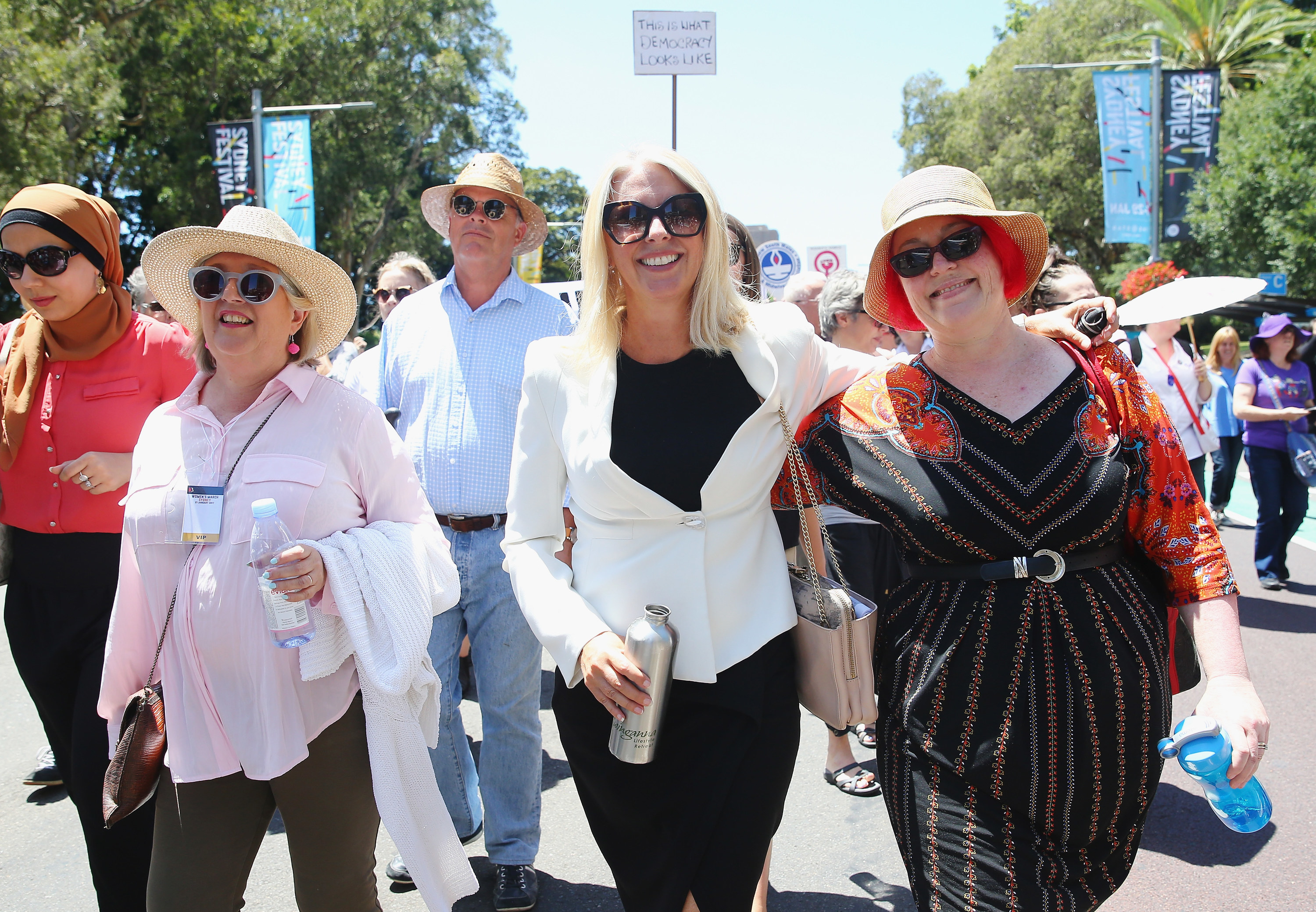
For many survivors, Spicer has done justice to these stories. Mandy Collins, who won a landmark sexual harassment case against her boss, painted “the formidable” and “incredible” Spicer for the Archibald Prize. Louise Langdon, one of Don Burke’s accusers, describes her as the courageous “trailblazer for #MeToo in Australia”.
Collins’ portrait missed out on the Archibald, but Spicer has scooped up a raft of accolades in the two years since her tweet: Mamamia’s 2017 Woman of the Year; one of Apolitical’s 100 Most Influential People in Gender Policy in 2018; CEO Magazine’s top 10 leading businesswomen (2018); Boss Magazine’s 14 True Leaders (2018); the Financial Review's Qantas 100 Women of Influence (2018); the 2018 Women’s Agenda Agenda Setter of the Year; and an Order of Australia (2018). Earlier this year she won the NSW Premier’s Award for Woman of the Year, and then beat star footballer Sam Kerr for the Excellence in Women’s Leadership Award 2019.
In May 2018 Screen Australia provided $15,000 of funding towards a documentary following Spicer and her work to “reveal the true story of Australia's hidden epidemic of workplace sexual harassment”. The working title is Silent No More. In March this year Spicer she said she was writing a book.
In the second half of 2018, and into 2019, Spicer and NOW have appeared in the media less frequently. The board was busy recalibrating, and quietly posted NOW’s changed plans on the website following the November AGM.
Meanwhile, Spicer revealed that in June she had been diagnosed with a major depressive disorder. “I have been struggling to make it through each day ever since,” she wrote on Facebook. “Without the support of my family and close friends during this difficult time, I doubt I would be alive today.” Spicer told BuzzFeed News the diagnosis was a result of vicarious trauma.
“Unfortunately, this is experienced by many volunteers and staff members in the women’s sector,” she said.
Spicer said she had been “deeply moved, deeply disturbed, and deeply distressed by the experiences described to me”.
“It truly is a national disgrace. We should all be ashamed that we allowed the conditions in which this kind of behaviour can flourish. And the focus should be on taking action to ensure it won’t continue,” she said, calling for #MeToo to “move beyond” the media to the lowest paid industries.
“I have spent the past year visiting marginalised communities across Australia, in the hope that structural change from #MeToo includes everyone, not just the top end of town.”
NOW board directors give Spicer credit for the immense amount of work she did in propelling the Australian movement.
“She did an amazing amount for someone who also had to work and have a family,” Katherine Teh told BuzzFeed News. “She certainly got people engaged and involved.”
To Nareen Young, Spicer is a “very genuine feminist” committed to eradicating workplace sexual harassment — but also someone who took feedback very personally and had difficulty separating herself from NOW.
“I’ve been involved in the not-for-profit sector for quite a long time,” Young said. “It’s very dangerous when organisations become about individuals. It was apparent to me that it was about an individual and that [set off] alarm bells for me.”
Women have continued to entrust Spicer with their stories. At the March 2018 launch of NOW she put the disclosure count at 1,500. By July 2018 it was up to 2,000. In September this year, Spicer told a media conference she had more than 2,500.
The high-profile Geoffrey Rush defamation case — in which Rush won $2.9 million and his accuser, Eryn Jean Norvill, was labelled an unreliable witness — and Craig McLachlan’s delayed defamation trial have fuelled commentary that restrictive laws are spooking accusers and editors from telling #MeToo stories.
Spicer told BuzzFeed News she co-founded NOW “after it became clear our defamation laws were severely restricting the movement”. She still blames newsrooms — “allegations have become too close to their own executives” she repeated in November — as well as Australia’s tough defamation laws, which she says “protect the rich and powerful”.
Funnell, who has reported on sexual violence for years, including a story that took two and a half years to tell due to Tasmania’s sexual assault victim gag law, thinks that’s a cop-out.
“There is no question that [Australia's defamation law] presents challenges but it is a complete misnomer to say that it makes stories impossible,” she said.
Even if a large number of the stories in Spicer’s inbox would be too legally difficult to get across the line, Funnell said, it was a “complete disservice” to people who had disclosed not to do something “meaningful” with the data. She suggested a report with anonymous case studies and data analysis that considered barriers to reporting and institutional responses.
Funnell said she was initially concerned for Spicer's wellbeing, in the context of “the vicarious trauma of hearing disclosure after disclosure”. But as time went on, and the promised stories didn’t materialise, Funnell’s concerns grew over how NOW and Spicer were handling disclosures.
“Those concerns significantly intensified when survivors began to talk to each other and it was becoming increasingly clear that not all survivors had even heard back after disclosing,” she said. “All journalists receive emails that we can never get back to, including disclosures of some form that we can never get back to, but it is different if you’ve proactively solicited them.”
Funnell says there is a lot of evidence that a person’s recovery from sexual violence is tied to the attitudes they encounter on disclosing.
“If a person is ignored, or deprioritised or simply not believed, that exacerbates feelings of blame, shame, guilt and makes them significantly less likely to reach out for help in the future, [and] that is to the absolute benefit of perpetrators,” she said.
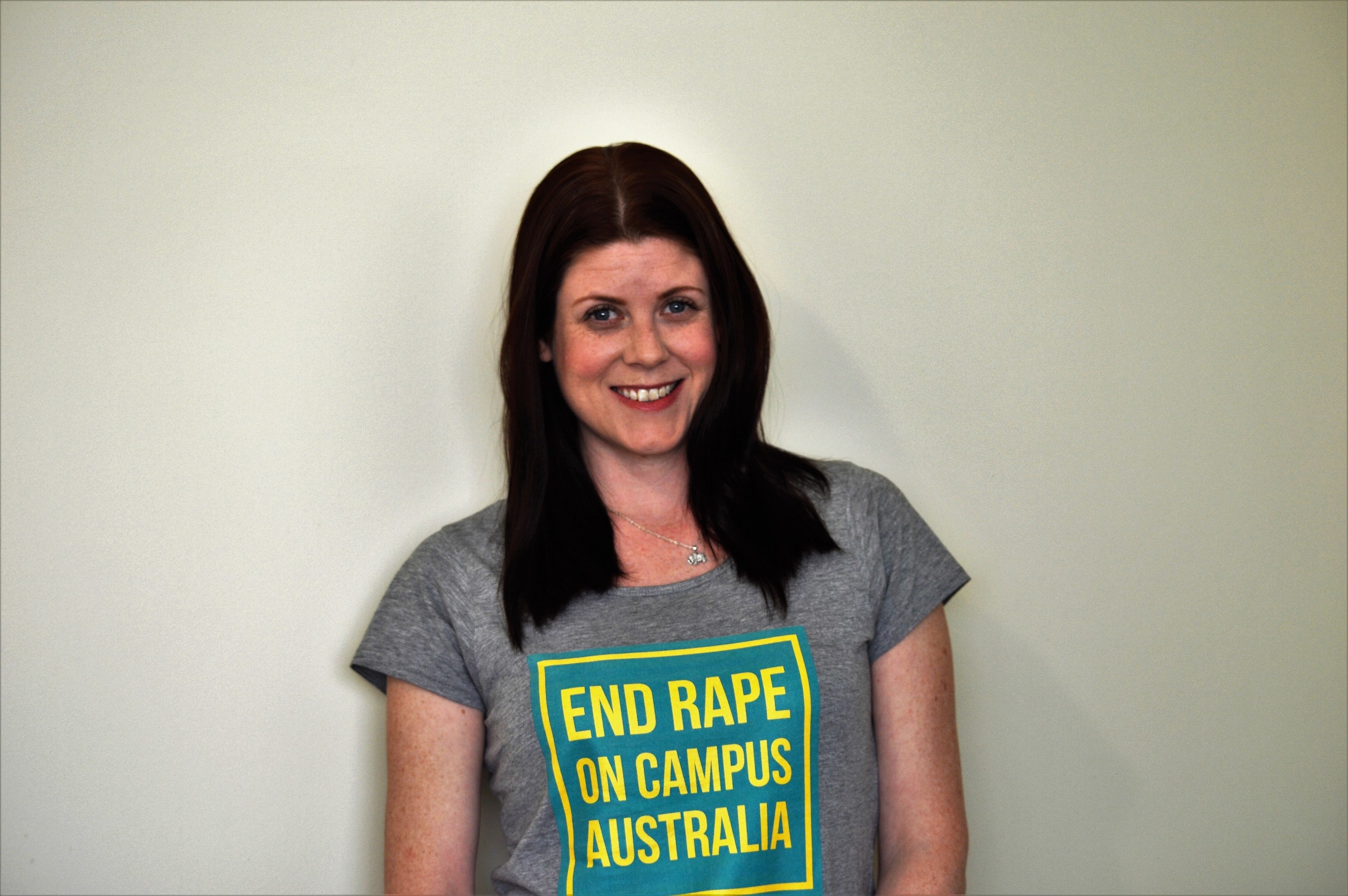
End Rape on Campus (EROC) director Sharna Bremner has worked for six years with university students experiencing sexual harassment and assault. She said her organisation runs on “the smell of an oily rag” and “had to start cleaning up [Spicer’s] mess”.
“We had survivors coming to us who had poor experiences [with NOW] and we then had to provide support and referral,” she said.
Bremner was optimistic when Spicer launched NOW, but now sees it as a waste — a rare burst of momentum hopelessly squandered.
“They had a moment and it’s a moment that none of us will ever get back,” she said. “It was a moment in time that was only ever going to happen once, they stole it and let it kind of fizzle out.”
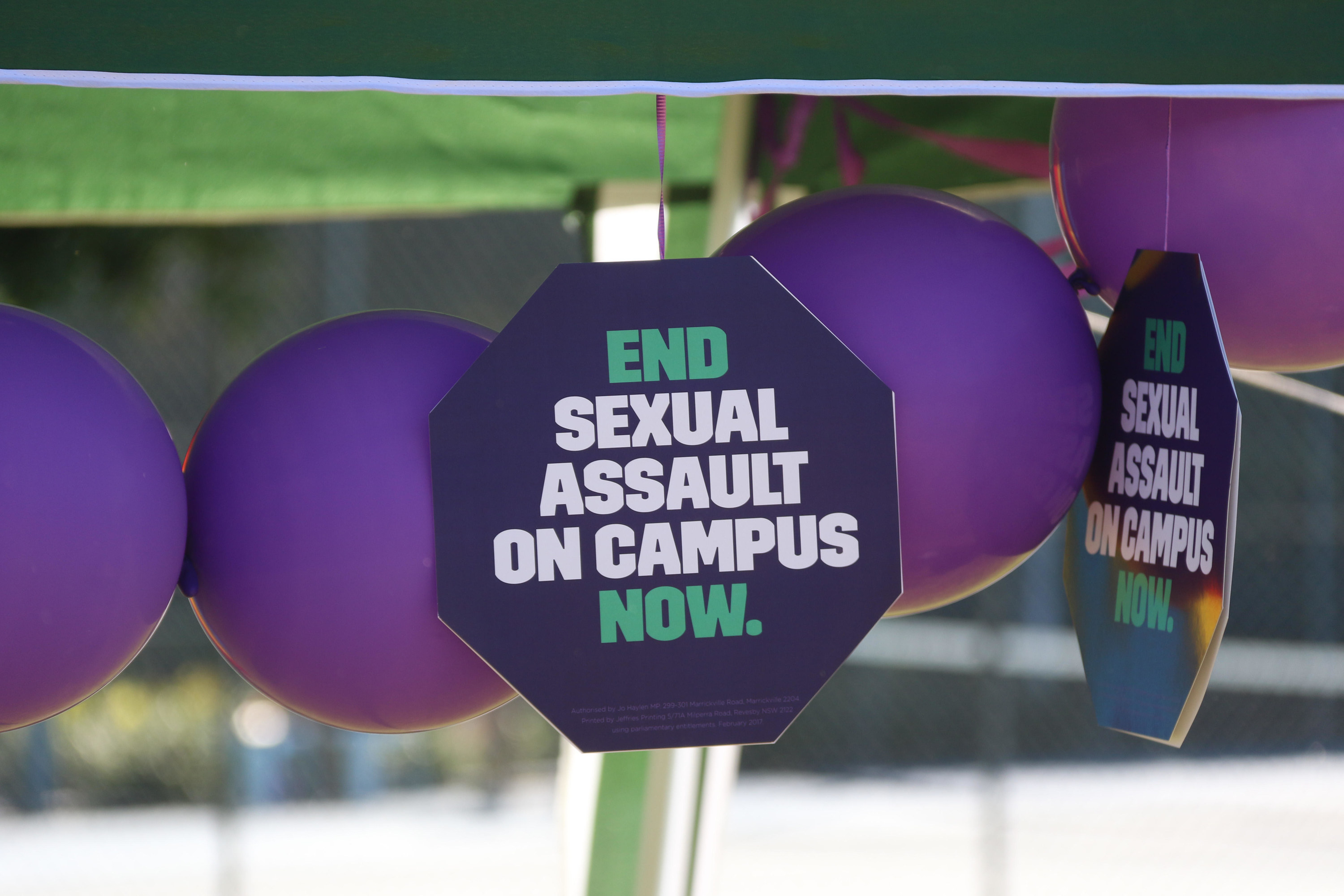
In its first 18 months, what has NOW done?
It brought together lawyers for a legal roundtable to discuss ways to tackle #MeToo in April 2018. In February 2019 it made a thorough submission to the Human Rights Commission’s sexual harassment inquiry. It signed on to a joint statement calling for action from governments and employers to prevent workplace sexual harassment. It collaborated with Fair Agenda to publish an election scorecard ahead of the federal election in May. It hosted and organised several events.
It has a new executive director: Genevieve Burnett. She describes sexual harassment as a “wicked problem”, one that is “created by humans and incredibly difficult to solve”. After all, 85% of Australian women have experienced sexual harassment, but only 17% of people who experienced it in the workplace in the last five years made a formal complaint or report.
The beginning was “rushed” and littered with mistakes, she said. Now, Burnett — who has been on the NOW steering committee since the beginning — wants to build on Ziwica’s work to turn NOW into an organisation that effectively fights that wicked problem.
“When I took on this role it was on the basis that the focus would shift from high-profile coverage and splash to becoming more of an organisation focused on quality work that actually helps people,” she told BuzzFeed News.
NOW has scaled back its ambitions, with two projects in the pipeline. The first is an “equality and justice fund”, which will fund strategic litigation for people fighting workplace sexual harassment, like Time’s Up’s fund. The first thing the fund will support is NOW’s second project: expanding an online tool that provides resources and connects people to pro bono legal advice to cover sexual harassment. Burnett believes the latter will be a crucial tool for survivors.
The hurdle is money. NOW only ever raised about $130,000, well short of the $250,000 it had hoped for on launch. It needs $50,000 to pay for the online portal, and then more for the fund. The organisation would also like a full-time executive director; Burnett and Ziwica were both hired on a part-time basis because of funding constraints.
Loch declined to share NOW’s most recent accounts because they had not yet been audited. The June 2018 accounts show just over $100,000 on hand, the remaining $30,000 or so from the crowdfunding spent on salary, insurance and consultancy fees.
An auspicing agreement with feminist organisation YWCA means NOW can accept tax-deductible donations, but its current crowdfunding campaign is well short of its target of $30,000. It won’t be receiving Spicer’s Sydney Peace Prize money — her share of $50,000 — as she has pledged it to a non-profit supporting Aboriginal victims of family violence.
Loch told BuzzFeed News NOW would seek corporate donations, as well as speaking to philanthropists and foundations. “We had hoped that government funding might be an option. There’s not an appetite for that in this environment and we’re parking that,” she said.
Despite funding woes, and feeling chastened by their earlier mistakes, the women at NOW are cautiously optimistic. “We won’t ever match the size of Time’s Up, but we’re certainly looking to have the impact that Time’s Up is having,” Loch said.
The triage service did not get off the ground, but Ziwica believes there’s still a need for a well funded referral service for those experiencing sexual harassment in the workplace.
She wants to see the remit of 1800RESPECT expanded to include sexual harassment, as well as extra funding for state-based services.
Ziwica said that robust debate is important “particularly within feminist and activist circles” when drafting a road map for change. She believes the #MeToo movement in Australia still has hope, as defined by essayist Rebecca Solnit in Hope in the Dark, who wrote that hope is not like “a lottery ticket you can sit on the sofa and clutch, feeling lucky” but an “axe you break down doors with in an emergency”.
“I feel that for #MeToo in Australia there are a number of women who spoke out who are forging that axe that they are intending to break down that door with,” Ziwica said.
Dhanya Mani has in some ways been operating her own one-woman triage model. Since going public with her story, Mani has been contacted by dozens of women with their stories of sexual harassment across the political spectrum “perpetrated by politicians, senior party members and union officials”.
She has linked them to legal and media resources and supported them personally, sharing her knowledge of criminal law for advice on things like making a police complaint.
“I’ve been staying up all hours of the night on hours long phone calls talking to women, supporting women and I’ve been feeling incredibly alarmed because … these stories reveal things that are worse than I could ever have imagined.”
It is these women — survivors — who Ziwica wishes were accepting the Sydney Peace Prize next month.
“That might have been a nice way to honour the contribution that they have made, which was significant, and bears repeating time and time again.” ●
If you or someone you know is experiencing violence and needs help or support, there are national and state-based agencies that can assist you 24 hours a day, seven days a week. Call 1800 RESPECT (1800 737 732).

